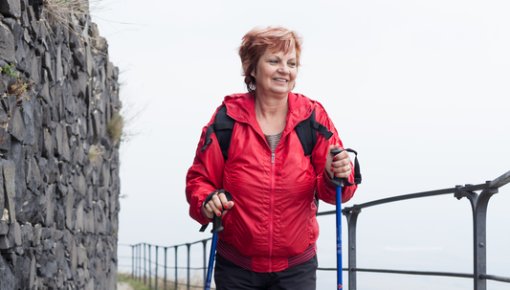Carayol M, Bernard P, Boiché J et al. Psychological effect of exercise in women with breast cancer receiving adjuvant therapy: what is the optimal dose needed? Ann Oncol 2013; 24(2): 291-300.
Chiu HY, Huang HC, Chen PY et al. Walking improves sleep in individuals with cancer: a meta-analysis of randomized, controlled trials. Oncol Nurs Forum 2015; 42(2): E54-62.
Dong B, Xie C, Jing X et al. Yoga has a solid effect on cancer-related fatigue in patients with breast cancer: a meta-analysis. Breast Cancer Res Treat 2019; 177(1): 5-16.
Furmaniak AC, Menig M, Markes MH. Exercise for women receiving adjuvant therapy for breast cancer. Cochrane Database Syst Rev 2016; (9): CD005001.
Lahart IM, Metsios GS, Nevill AM et al. Physical activity for women with breast cancer after adjuvant therapy. Cochrane Database Syst Rev 2018; (1): CD011292.
Lipsett A, Barrett S, Haruna F et al. The impact of exercise during adjuvant radiotherapy for breast cancer on fatigue and quality of life: A systematic review and meta-analysis. Breast 2017; 32: 144-155.
McNeely ML, Campbell K, Ospina M et al. Exercise interventions for upper-limb dysfunction due to breast cancer treatment. Cochrane Database Syst Rev 2010; (6): CD005211.
O'Neill M, Samaroo D, Lopez C et al. The Effect of Yoga Interventions on Cancer-Related Fatigue and Quality of Life for Women with Breast Cancer: A Systematic Review and Meta-Analysis of Randomized Controlled Trials. Integ Cancer Ther 2020; 19: 1534735420959882.
Ramírez-Vélez R, Zambom-Ferraresi F, García-Hermoso A et al. Evidence-Based Exercise Recommendations to Improve Mental Wellbeing in Women with Breast Cancer During Active Treatment: A Systematic Review and Meta-Analysis. Cancers (Basel) 2021; 13(2): 264.
Tang MF, Chiu HY, Xu X et al. Walking is more effective than yoga at reducing sleep disturbance in cancer patients: A systematic review and meta-analysis of randomized controlled trials. Sleep Med Rev 2019; 47: 1-8.
Van Vulpen JK, Peeters PH, Velthuis MJ et al. Effects of physical exercise during adjuvant breast cancer treatment on physical and psychosocial dimensions of cancer-related fatigue: A meta-analysis. Maturitas 2016; 85: 104-111.
Yang H, Yang Z, Pan H et al. Effects of physical activity on sleep problems in breast cancer survivors: a meta-analysis. Support Care Cancer 2021; 29(7): 4023-4032.
Yi LJ, Tian X, Jin YF et al. Effects of yoga on health-related quality, physical health and psychological health in women with breast cancer receiving chemotherapy: a systematic review and meta-analysis. Ann Palliat Med 2021; 10(2): 1961-1975.
IQWiG health information is written with the aim of helping people understand the advantages and disadvantages of the main treatment options and health care services.
Because IQWiG is a German institute, some of the information provided here is specific to the German health care system. The suitability of any of the described options in an individual case can be determined by talking to a doctor. informedhealth.org can provide support for talks with doctors and other medical professionals, but cannot replace them. We do not offer individual consultations.
Our information is based on the results of good-quality studies. It is written by a team of health care professionals, scientists and editors, and reviewed by external experts. You can find a detailed description of how our health information is produced and updated in our methods.

